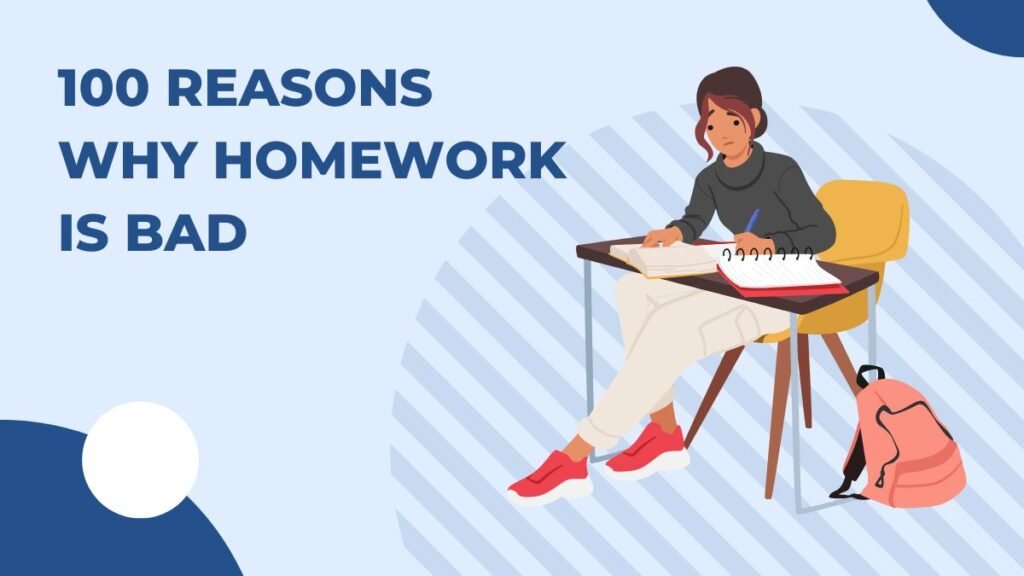Discover the detrimental effects of homework with our comprehensive list of 100 reasons why homework is bad. From stress and burnout to limiting creativity and family time, explore the drawbacks of excessive homework here.
Textbooks slammed shut, groans echoing through the halls, backpacks overflowing with worksheets – the dreaded homework monster has shown its face once more. But guess what? There’s another path we can take.
This book dives into the homework debate, exploring 100 reasons why the usual homework routine might not be all it’s cracked up to be. From killing creativity to piling on stress, we’ll challenge the norm and look at different ways of learning.
But hey, hold up! Before you toss your textbooks out the window, this isn’t just a rant. We’ll also check out the other side. Is homework really all bad? Can we find ways to make it better?
Whether you’re a student wanting change, a parent questioning things, or a teacher searching for new ideas, this book is your ticket to a lively chat. Let’s talk homework and find ways to make learning more exciting and effective for everyone.
Ready to kick the old routine and try something new? Let’s go!
100 Reasons Why Homework Is Bad
Check out 100 reasons why homework is bad:-
Academic Impact
- Forgetting Stuff: Homework overload can make students forget what they learned.
- No Time for Fun Learning: Too much homework means no time to really explore cool stuff.
- Just Memorizing: Homework often focuses on memorizing stuff instead of really understanding it.
- Not Fair for Everyone: Some kids have more help at home, giving them an advantage.
- Boring Homework: Doing the same kind of homework all the time kills creativity and makes kids less interested in thinking for themselves.
Health Impact
- Stress Overload: Homework stress can pile up, making kids feel overwhelmed.
- Messed-Up Sleep: Too much homework cuts into sleep time, messing with sleep patterns.
- Less Moving, More Sitting: Too many assignments mean less time to move and play.
- Mental Health Blues: Homework pressure can make kids feel down or anxious.
- Burnout Risk: Too much work can leave kids feeling exhausted and drained.
Social Impact: Social Impact
- Family Fights: Homework stress can strain relationships between kids and their families.
- Less Hangout Time: Lots of homework means less time for fun with friends.
- Missing Out on Fun Stuff: Too much homework can stop kids from joining clubs or teams.
- Feeling Lonely: Homework overload can make kids feel left out or alone.
- Social Skills Take a Hit: Spending all that time on homework means less time to practice talking and being with others.
Psychological Impact
- Learning Blues: Too much homework makes kids less excited about learning.
- Feeling Down: Homework stress can make kids feel bad about themselves.
- More Worries, Less Smiles: Too many assignments can make kids feel more anxious or sad.
- Totally Swamped: Too much homework feels like being buried in work.
- School Isn’t Fun: Homework overload can make kids think school is boring or not cool anymore.
Time Management
- Too Much to Do: Homework overload leaves little time for anything else.
- No Time for Fun: Lots of homework means less time for hobbies and fun stuff.
- School Takes Over: Balancing school and life becomes super hard.
- Procrastination Station: Too many assignments can make kids put things off.
- Time Skills Need Work: Homework overload means less chance to learn how to manage time.
Family Dynamics
- Time Eater: Homework eats up family time that could be spent together.
- Relationship Strain: Homework stress can make parents and kids argue more.
- Tension City: Too much homework can make the home feel tense and stressed.
- Less Talking, More Grumbling: Homework overload can make it hard for families to chat and connect.
- Messing with Traditions: Homework can get in the way of family traditions like dinner together or movie nights.
Creativity and Exploration
- Creativity Killer: Homework stifles kids’ creative juices.
- No Room to Roam: Lots of homework means less chance to explore new things.
- Memorize, Don’t Create: Homework often focuses on memorizing facts instead of coming up with new ideas.
- No Time for Fun Projects: Too much homework leaves little time for kids to work on their own cool ideas.
- Critical Thinking Crunch: Homework overload makes it tough for kids to think outside the box.
Equality and Equity
- Making Things Unfair: Homework can make it harder for some kids to succeed.
- No Resources, No Luck: Kids without stuff like computers or quiet places to work are at a disadvantage.
- Making the Gap Bigger: Too much homework can widen the gap between rich and poor students.
- Money Talks: Homework can make it seem like only kids with money can do well in school.
- No Help, No Hope: Homework overload leaves struggling students with less support to catch up.
Teacher-Student Relationships
- Homework Hassle: Homework stress can strain the bond between teachers and students.
- Talk Less, Stress More: Lots of homework can make it hard for students and teachers to talk openly.
- Trust Troubles: Homework overload can make students feel like teachers don’t understand their struggles.
- Frustration Zone: Too much homework can lead to frustration for both students and teachers.
- Understanding Lost: Homework overload makes it tough for teachers to know if students really get the material.
Educational System
- Stuck in the Past: Homework can keep old-school teaching methods alive instead of trying new things.
- One Size Fits None: Homework might not work for everyone’s learning style.
- More, More, More: Too much homework focuses on doing lots of work, not doing it well.
- No Room for New Ideas: Homework overload can stop teachers from trying out cool new ways to teach.
- Testing, Testing, 1-2-3: Homework overload means less time for other ways to see if students are learning.
Cognitive Development
- Slows Down Brain Growth: Too much homework can hold back how kids’ brains grow.
- Shallow Learning Waters: Homework overload means less chance to really dive deep into a subject.
- Missing Out on Different Views: Lots of homework means less time to see things from different angles.
- Problem-Solving Put on Hold: Homework overload can stop kids from getting good at fixing things.
- Less Time to Learn on Their Own: Too much homework means less chance for kids to learn stuff by themselves.
Community Engagement
- Community Cut-off: Homework overload means less time to join community events.
- Volunteering Vacancy: Lots of homework leaves little time for kids to help out in their community.
- Missing Out on Local Help: Homework can stop kids from using cool local resources for learning.
- Less Connected Feels: Too much homework means less chance to feel like you belong in your community.
- Civic Skills Stuck: Homework overload can make it tough for kids to learn how to be good community members.
School Environment
- Stress Central: Homework overload adds to the stress levels in schools.
- Low Spirits: Lots of homework can make the vibe at school feel down.
- No Smiles Allowed: Homework overload makes it hard to build a positive vibe.
- Struggling to Help: Too much homework means schools have less resources to support students.
- Wellness on Hold: Homework overload can make it tough for schools to help kids feel good.
Overall Well-being
- Life Quality Drop: Too much homework makes life less fun and enjoyable.
- Missing Out on the Big Picture: Homework overload can stop kids from growing in all areas.
- Personal Passions Put Aside: Lots of homework leaves little time for kids to do what they love.
- Learning Less Fun: Homework overload takes the joy out of learning.
- Happiness Hits Rock Bottom: Too much homework makes it hard for kids to feel happy overall.
Future Success
- Not a Sure Thing: Lots of homework doesn’t always mean kids will be successful later on.
- Missing Life Skills: Homework overload leaves less time to learn important stuff for life.
- Not Ready for Real Life: Too much homework can make it hard for kids to handle real-world problems.
- Self-Discovery Stalled: Homework overload means less chance for kids to figure out who they are.
- Dreams Derailed: Too much homework stops kids from chasing their dreams and interests.
Work-Life Balance
- Bad Work Habits: Homework overload teaches kids to overwork themselves, which isn’t healthy.
- Balance Out of Whack: Too much homework messes up the balance between work and fun.
- Stress Skills Left Behind: Homework overload means less time to learn how to handle stress.
- Dreaming Too Big: Lots of homework can make kids think they need to work all the time when they grow up.
- No Time to Chill: Homework overload stops kids from learning how important it is to relax and take breaks.
Technology and Screen Time
- Screen Time Spikes: Homework with online resources means more time staring at screens.
- Tech Addiction Alert: Too much screen time from homework can make kids addicted to technology.
- Talking Trouble: Homework overload means less time to practice talking face-to-face.
- Social Skills Slump: Lots of homework stops kids from learning how to be social in real life.
- Digital Dependence: Homework with lots of online stuff makes kids rely too much on screens for learning.
Innovation and Adaptability
- Stuck in the Old: Too much homework makes it hard for kids to adapt to new things.
- Missing Out on Fresh Ideas: Homework overload means less chance to learn about cool new stuff.
- Creativity on Pause: Lots of homework leaves little time to think up new ideas.
- Boxed-In Thinking: Homework overload stops kids from thinking in new and different ways.
- Not Ready for Surprises: Too much homework makes it tough for kids to handle unexpected challenges in the future.
Teacher Workload
- More Work, Less Rest: Homework means more work for teachers, which can make them tired out.
- Burnout Risk: Too much homework can lead to teachers feeling burnt out and exhausted.
- Less Time to Help: Homework overload means less time for teachers to give individual feedback to students.
- Boring Lessons Ahead: Lots of homework leaves less time for teachers to plan fun and interesting lessons.
- Learning Stuck: Homework overload can stop schools from spending resources on helping teachers get better at teaching.
Student Autonomy
- Less Learning Freedom: Homework overload means less chance for students to learn on their own terms.
- Not in Control: Lots of homework can make students feel like they don’t own their education.
- Just Sitting and Listening: Homework overload makes it hard for students to be active in their learning.
- Motivation MIA: Too much homework stops kids from wanting to learn just for the sake of learning.
- Student Voices Not Heard: Homework overload means schools forget how important it is for students to have a say in their own learning.
What are 10 disadvantages of homework?
Check out 10 disadvantages of homework:-
- Stress: Homework can stress kids out.
- Boredom: It makes learning boring.
- Not Always Helpful: Sometimes it doesn’t help much.
- Not Fair: Some kids can’t do it at home.
- No Creativity: There’s no room for creativity.
- Not Real Life: It doesn’t feel useful for real life.
- Just Memorizing: Feels like just memorizing stuff.
- Too Much Screen Time: Kids spend too much time on screens.
- No Fun Time: Leaves no time for fun activities.
- Family Fights: Causes fights at home.
Why should homework be illegal?
Why Homework Might Not Be Great:
- Too Much Stress: Homework can stress kids out.
- Boring Learning: It makes learning boring.
- Not Fair: Some kids can’t do it at home.
- Not Always Helpful: Sometimes it doesn’t help much.
- No Fun Time: It leaves no time for fun.
- Just Memory Work: Feels like just memorizing stuff.
- No Creativity: There’s no room for creativity.
- Too Much Screen Time: Kids spend too much time on screens.
- Family Fights: Homework fights make home life stressful.
- Better Ideas Needed: Let’s find better ways to learn.
Why Banning Homework Might Not Be the Best
- Practice Makes Perfect: Homework helps practice what’s learned.
- Learning Skills: It teaches important skills like time management.
- Family Bonding: Some homework involves parents, which is cool.
- Finding Balance: Instead of banning, let’s make homework better.
Better Ways to Learn
- Real-world Projects: Projects that are fun and teach real stuff.
- Tailored Homework: Homework that suits different kids’ styles.
- Active Learning: Fun activities in class that make us think.
- Quality Homework: Homework that’s useful and not too much.
The Goal
We want learning to be fun and useful for everyone. Let’s find a balance that works for all of us!
Conclusion
We’ve covered 100 reasons why traditional homework might not be the best path. But before we start a revolution, let’s pause for a moment.
This discussion isn’t about hating learning or homework altogether. Our brains need practice and reinforcement to grow. The aim was to start a conversation and question the norm. How can we make learning more exciting, foster critical thinking, and empower students?
The good news? Change is happening. Educators worldwide are trying new things:
- Project-based learning: Students tackle real-world problems, boosting creativity and teamwork.
- Personalized learning: Homework fits each student’s needs and learning style.
- In-class engagement: Interactive activities replace boring drills, sparking curiosity.
Remember, you’re not alone. Students, parents, and teachers can join forces for a better learning experience.
So, take a break from the textbooks (you deserve it!). Let’s rethink homework, not abandon learning.
The future of education is bright. Let’s create a system where students are eager to explore, discover, and thrive. Adventure awaits!


